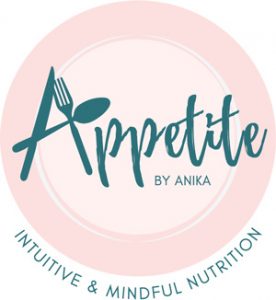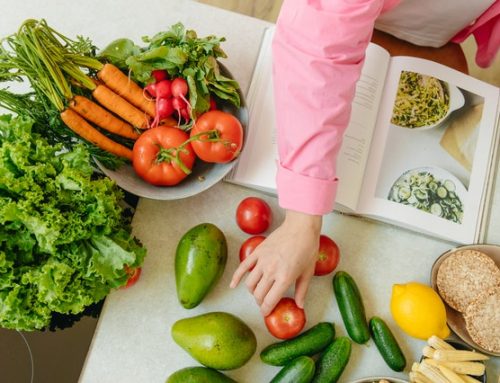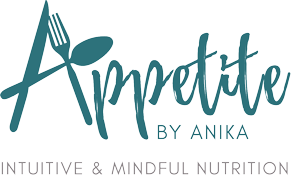I think most of us can agree, the past year and a half has been tough. With all the lockdowns, social distancing, and loss of work, it’s not surprising that many of us have struggled with our mental health. Since the pandemic hit, rates of anxiety and depression have more than doubled1 in Australia. Back in August, there was a record breaking number of calls to mental health crisis helplines. So looking out for your mental health is so important, now more than ever. While food shouldn’t replace seeking support, there are some foods and nutrients that may help improve your mood! So what are the good mood foods?

Plants
Many studies,2 have shown following a Mediterranean-style diet rich in fruit, veg, legumes and wholegrains may actually protect against depression and its symptoms. In general, there is growing evidence3 that eating more fruits, veggies and well… plants, may reduce your risk of depression. Links between stress disorders (including depression) and inflammation are starting to emerge,4 so it’s thought these foods help improve mood because they’re rich in antioxidants and other anti-inflammatory factors. Feeding your gut bacteria with fibre from these foods may also support mental health by promoting good gut health!
Want to go more plant-based? Try this Linguini with mushrooms and meatless meatballs or Chickpea Chaat!
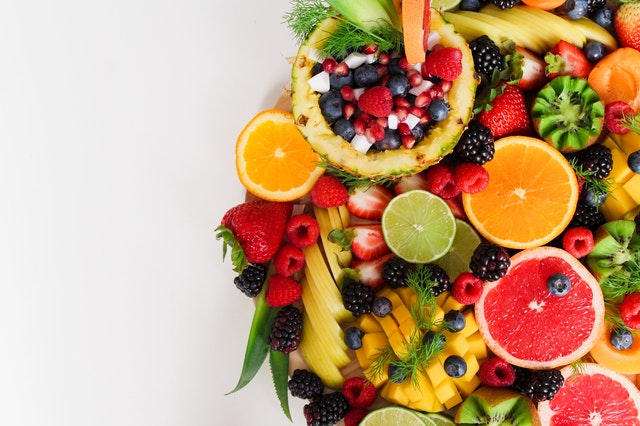
Oily fish
The Mediterranean diet also recommends eating fish at least twice a week which may also contribute to its benefits for mental health. Fatty fish like salmon, tuna and mackerel are packed with long-chain omega-3 fatty acids. Not only are these Omega-3’s great for the brain but they may also help improve your mood. A review of thirteen studies5 showed long-chain omega-3’s reduced depressive symptoms in people with major depressive disorder. While we don’t exactly know why, we do know omega-3’s have anti-inflammatory properties and might help release the ‘happy chemical’ – serotonin!
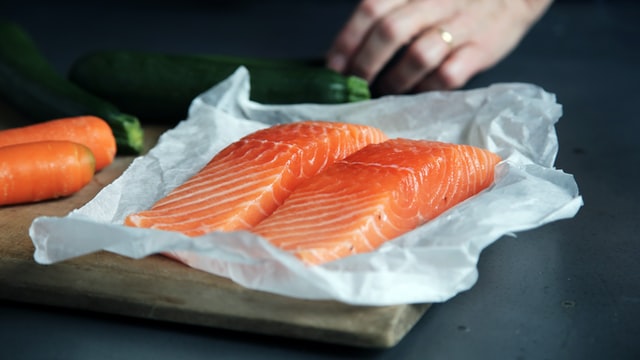
Grains
Grains may also give you boost of serotonin! Grains like corn and oats contain an amino acid called tryptophan which the body uses to make serotonin. But that’s not all grains are good for! Maintaining stable blood sugar levels can help reduce irritability and mood swings. Many wholegrains like oats or grainy breads are digested slowly, providing a steady release of sugar into your blood to help manage your mood! Not to mention, bread and pasta = happiness, am I right?
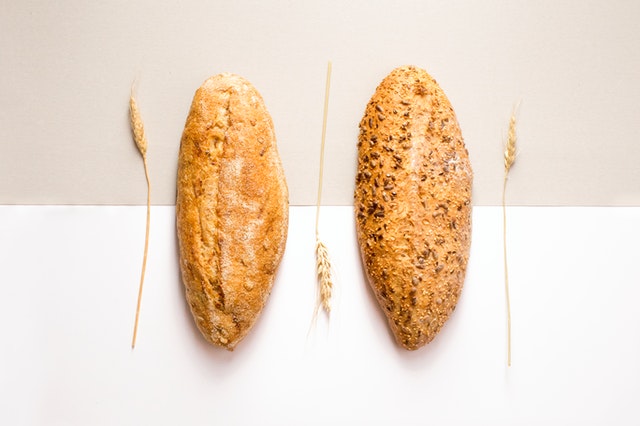
Fermented foods
Did you know the gut and brain are linked? Turns out the good bacteria in our gut produce a bunch of chemicals which can act on the brain. In fact, up to 95% of our body’s serotonin is made in our gut! Fermented foods like yoghurt, sauerkraut and kimchi contain probiotics which adds beneficial bacteria6 to your gut. While more studies are needed, many small reviews7 suggest probiotics may reduce symptoms of anxiety and depression by promoting gut health. Just a heads up, fermented foods like alcohol and some breads don’t actually provide a significant source of probiotics due to the way they’re processed.
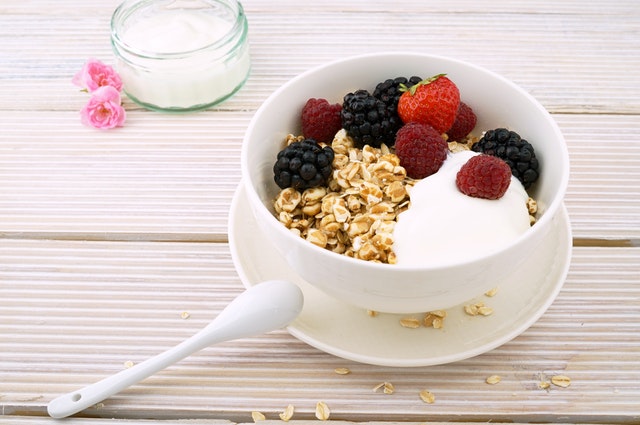
The bottom line: There is no one magic food for mental health. The best foods for mental health are the same ones that are good for overall health, so it’s important to maintain a balanced diet. But remember you’re going through a pandemic and lockdown hasn’t been easy on anyone. So if you want a slice of cake, have a slice of cake – balance includes ALL foods.
If you’re looking for more dietary support during these difficult times, click here to book a FREE Discovery Call.
If you’re struggling with your mental health, please reach out for support. You can visit Beyond Blue to chat with someone online or over the phone (1300 22 4636).

References
1. Australian Institute of Health and Wellfare, Mental Health Impact of COVID-19 from https://www.aihw.gov.au/getmedia/0e4bf78e-5ec2-4c00-93b4-52e29203b53f/Mental-health-impact-of-COVID-19.pdf.aspx
2. Lassale C, Batty GD, Baghdadli A, Jacka F, Sánchez-Villegas A, Kivimäki M, Akbaraly T. Healthy dietary indices and risk of depressive outcomes: a systematic review and meta-analysis of observational studies. Mol Psychiatry. 2019 Jul;24(7):965-986. doi: 10.1038/s41380-018-0237-8. Epub 2018 Sep 26. Erratum in: Mol Psychiatry. 2018 Nov 21;: Erratum in: Mol Psychiatry. 2021 Mar 4;: PMID: 30254236; PMCID: PMC6755986.
3. Donato Angelino, Justyna Godos, Francesca Ghelfi, Maria Tieri, Lucilla Titta, Alessandra Lafranconi, Stefano Marventano, Elena Alonzo, Angelo Gambera, Salvatore Sciacca, Silvio Buscemi, Sumantra Ray, Fabio Galvano, Daniele Del Rio & Giuseppe Grosso (2019) Fruit and vegetable consumption and health outcomes: an umbrella review of observational studies, International Journal of Food Sciences and Nutrition, 70:6, 652-667, DOI: 10.1080/09637486.2019.1571021
4. Maeng SH, Hong H. Inflammation as the Potential Basis in Depression. Int Neurourol J. 2019 Nov;23(Suppl 2):S63-71. doi: 10.5213/inj.1938226.113. Epub 2019 Nov 30. PMID: 31795605; PMCID: PMC6905209.
5. Mocking RJ, Harmsen I, Assies J, Koeter MW, Ruhé HG, Schene AH. Meta-analysis and meta-regression of omega-3 polyunsaturated fatty acid supplementation for major depressive disorder. Transl Psychiatry. 2016 Mar 15;6(3):e756. doi: 10.1038/tp.2016.29. PMID: 26978738; PMCID: PMC4872453.
6. Heinen, Emily; Ahnen, Rylee T. MS; Slavin, Joanne PhD, RDN Fermented Foods and the Gut Microbiome, Nutrition Today: 7/8 2020 – Volume 55 – Issue 4 – p 163-167 doi: 10.1097/NT.0000000000000422
7. Mueller M, Ganesh R, Bonnes, S. Gut Health = Mental Health? The Impact of Diet and Dietary Supplements on Mood Disorders. Current nutrition reports 9.4 (2020): 361–368.
